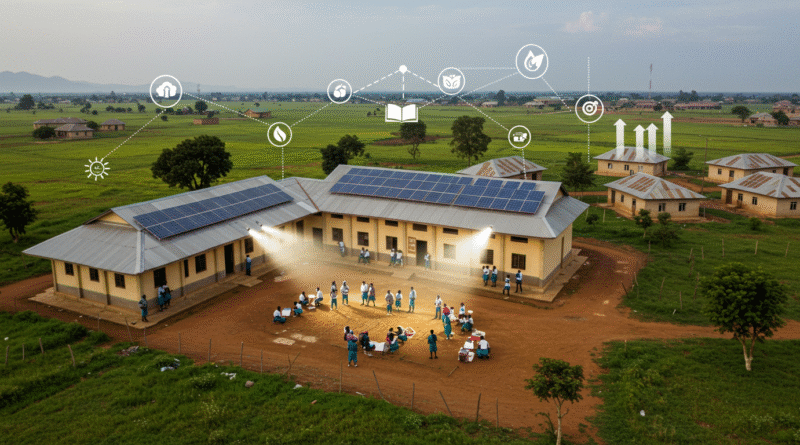Solar Schools in Nigeria: Education and Community Growth
Solar schools are emerging as a powerful bridge between sustainable education and real estate development. Across rural communities, new solar-powered schools are not only improving learning conditions but also increasing the value of surrounding properties. By integrating renewable energy into public infrastructure, these schools are transforming themselves into climate-resilient community hubs.
Solar Schools Transforming Ogun Communities
In Ogun State, projects like “Unleash a Child’s Potential” by Baobab+ Nigeria and JCI Abeokuta Hills have equipped schools such as Baptist Girls’ College Idi-Aba with solar-powered lighting. These upgrades extend study hours, enhance safety, and drastically reduce generator reliance.
Beyond the classrooms, the ripple effect is clear: land around these solar schools becomes more attractive for housing and commercial use. Families are drawn to neighborhoods where reliable energy and secure learning environments exist. In real estate terms, a solar-powered school can anchor community growth, boosting demand for residential and mixed-use developments nearby.
Solar-Powered Schools as Catalysts for Real Estate Growth
Another example is Wesley Nursery & Primary School in Ogun State, which benefited from Bluetti’s LAAF CSR initiative, providing portable solar kits to pupils. This small intervention delivers a big impact:
- Children gain safe, illuminated learning spaces.
- Parents feel more confident about school safety and reliability.
- Developers eye the area for residential clusters, teacher housing, and micro-business hubs that thrive around sustainable public infrastructure.
This model is now inspiring similar solar-school initiatives in the FCT. Authorities plan to integrate renewable energy labs and climate-focused vocational programs. Invariably, this links education, sustainability, and real estate opportunities.
Why Solar Schools in Nigeria Matters
By combining education with renewable energy, solar schools create resilient public spaces that drive local real estate appreciation. Communities with energy-stable public infrastructure naturally attract investors and residents. Also, the presence of eco-friendly facilities aligns with global ESG and climate goals.
In essence, solar schools in Nigeria shows that smart climate investment in public institutions can generate lasting social and economic returns, transforming once-overlooked rural plots into desirable development zones.
Let’s draw the curtains, shall we?
The rise of solar-powered schools in Nigeria signals a new era where public infrastructure and real estate development work hand-in-hand. By lighting classrooms with the sun, communities are also lighting a path toward sustainable growth, climate resilience, and higher property value.
As more of these projects emerge, solar school real estate Nigeria will remain a blueprint for how education, clean energy, and real estate can jointly transform communities for the better.
Seeking to explore more on real estate, check our previous post on Real estate trends to watch in 2025

